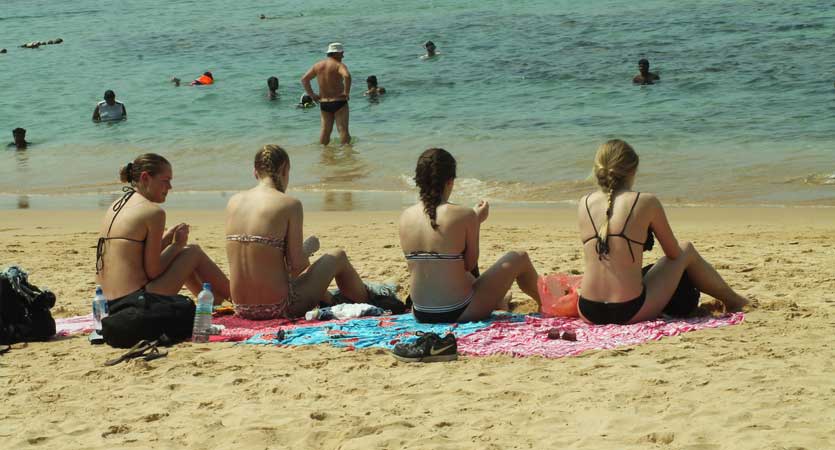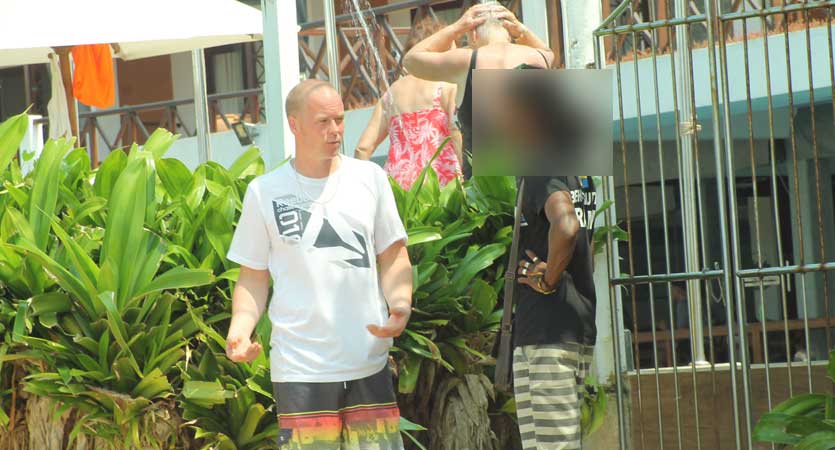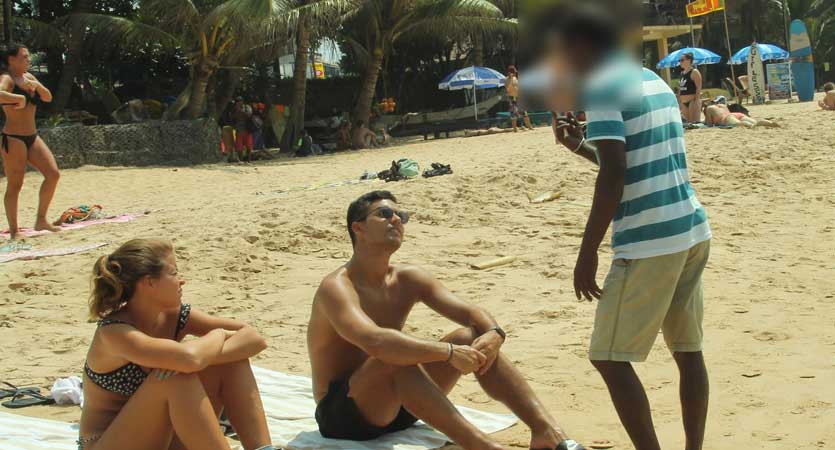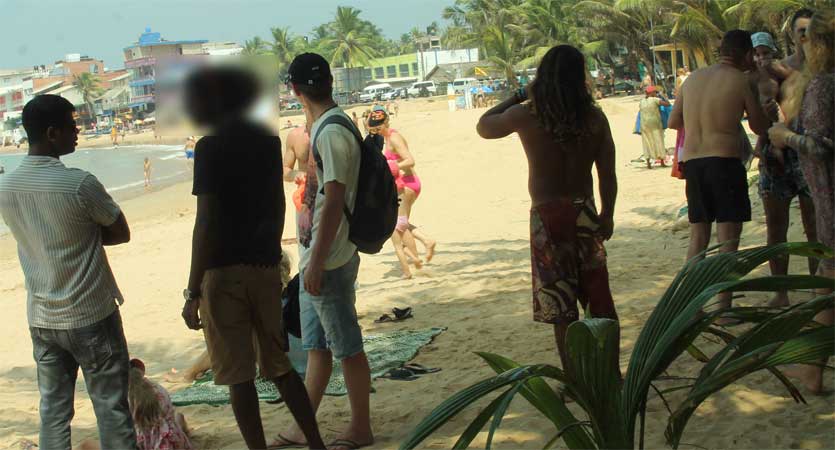Jan 18 2017.
views 21046The other side of tourism in the Southern coast of Sri Lanka
Tourism in Sri Lanka has had its ups and downs for the past few years. As in many other parts of the world, here too there is another side to the industry. Many locals find potential in it and others totally depend on it. Although frowned upon by many, beach boys have been frequenting the coastal belts - particularly in the South - for many years.

Beach boys, being a part of the local community, depend on tourism, sometimes making a tidy sum for ‘guiding’. Sometimes, in trying to ‘sell’ activities, tours or products, they are often seen as ‘harassing’ tourists who would rather just laze on the beach.
In some hotels down south, beach boys line the fence or borders of the hotels going up to the beaches, looking in, making those hoping to laze around the pool or sunbathe, a little uncomfortable. Yet, there are also those tourists who want to immerse themselves in the ‘local culture’ and thereby spend much of their time with the beach boys who befriend them.
Hikkaduwa and the South coast
When we visited Hikkaduwa to observe the activities, the situation was more or less the same as it would have been a few years ago; boys with long, tinted hair with piercings and tattoos clad in beachwear and a pair of flip-flops holding hands with foreign girls or even older women are a common sight on the roads.
Over the years there have been many grave instaces encountered by tourists as these ‘beach boys’ move on to the extent of harassing them for pleasure as well as for money.

We spoke to a few ‘guides’ in the area to find out what their day is usually like.
Travelling around with a tourist itself is a challenge : Chaminda
*Chaminda Silva who works as a licensed guide as well as a three-wheeler driver said that they usually visit the three-wheeler park in the morning and go on hires in turns.
“But it is difficult to be involved in this business. The tourism industry is going to the gutters. Tourists are usually more knowledgeable now and they are aware of the surroundings. In most instances they don’t request for a guide. During the season there are instances when we earn Rs. 10,000 - 15,000 a day. It is a huge challenge to travel around with a tourist. We should ensure that he or she is not harassed during their tour. There’s competition among the guides.”
Speaking in terms of relationships and intimate bonds developed among tourists and local guides, Chaminda said that sometimes local guides have 'relationships’ with tourists once they go on tours.
“Then eventually they get invited for a drink and the bond gets stronger during their stay, which often winds up in a ‘happy ending’. Some local guides continue the relationship until the point to when they get visa and then leave the foreigner they are attached to.”
Tourists visit Hikkaduwa mainly to ‘have fun’ : Harsha
*Harsha Perera is another guide who has been involved in this business for five years and according to him, one of the biggest challenges is learning different languages.

“We need to be well versed in languages in order to survive in this business. As of late there was an increase in Russian tourists but with the change of government, they don’t visit frequently. Different tourists have different ways of spending their stay. Some are more civilised and well-mannered than others. Among the local guides, there are some who would spend the entire stay with the tourist group and even go to the extent of having a drink, smoking weed and doing all sorts of notorious things with them. There aren’t many guides now in Hikkaduwa. I know of people who don’t get involved in this profession even though they have a license. They eventually end up working for a boat service or working in a hotel rather than being a guide. The guiding license could only be obtained once in five years. Sometimes a few people are given notice and the letters are sent to them in private. Thereafter they get registered and eventually receive the license. If you take the Hikkaduwa coastal belt you could find between 300 - 500 guides.”
“Many guides receive the City Guide license through which they can operate only in Hikkaduwa, while only a few of us receive the Area Guide license which gives them approval to cover the entire area from Benthara to Katharagama. On the other hand, if one needs to obtain the National Guide license it is a must that they do their higher studies and fulfill stricter regulations and requirements.The other side of this industry is that they also seek for pleasure. In such instances we also try to find a way to fill our pockets. So if a tourist comes and ask us to find them a ‘girl’ or ‘woman in the trade’ we don’t hesitate because that too is a part of this business. We then use our contacts and fulfill their requirements.
Tourists also ask us to get them drugs such as cocaine, heroin and others. In these instances we again try to make use of the opportunity and reap maximum benefits. It’s a first-come-first serve chance and we often do not intend to pass it on to the next person. Because if I object tourists from going in search of a sex worker or drugs, another guide would then fulfill their requirements and get the money.
This is a survival process. Hikkaduwa is known for its ‘hippie-tourism culture’ and tourists too are aware of this. Therefore they visit this area mainly to ‘have fun’.”
*Names of these individuals have been withheld

Responsible Tourism Partnership (RTP) – Sri Lanka
The Responsible Tourism Partnership is a project which was established back in 2004 by a group of pioneers and professionals from the Sri Lankan tourism industry. It aims at prioritising issues that are affecting the future sustainability of tourism in Sri Lanka. Whenever possible, they join hands with communities, NGOs and the government of Sri Lanka to identify and implement solutions that ensure the negative impacts of tourism are minimized and the positive impacts of tourism are maximised.
Responsible inbound tour operators
Under the RTP programme, one of the main projects is to produce more responsible inbound tour operators. The main focus of this project is to recognise the urgency for Sri Lankan tour operators to respond and the challenges they have to face. For those with limited resources to be tour operators RTP has partnered with the Travelife - a leading training, management and certification initiative for tourism companies committed to reach sustainability that has developed an easy-to-use solution for monitoring and improving the performance of tour operators.
Some of the main objectives of this project is to accredit a significant percentage of Sri Lanka’s tour operators under Travelife, assist Sri Lankan tour operators to address both the positive and negative impacts their business generate, allow them to become more competitive internationally by being more sustainable and raise awareness of the importance of a more sustainable future for the tourism industry in Sri Lanka.
Beach boys are now trained to become beach operators : Sujith Yamasinghe
Speaking to the Life Online, Sujith Yamasinghe, sociologist and manager of the Learning, Involving and Nurturing Community (LINC) project – a concept initiated by the RTP said that in his capacity he trains beach boys as means of reducing chances of harassment experienced by tourists.
“These informal tour guides do not get any formal training and because of them people tend to look down upon this industry. Some guides are school-leavers and others have minimum qualifications. I conduct this training mainly for guides working in the Bentota and Beruwala areas. One of the main reasons why they are given this training is for them to develop a good rapport with the tourists. Once they are trained we call them ‘beach operators’.
There are various types of guide licenses which could be obtained and that depends on what kind of a guide they want to be. There are site tour guides who are present at historical places and other attractions who take tourists only in that premises. Then there are area tour guides, chauffeur tour guides and national tour guides. Through this training they will be able to improve their skills in communication and other aspects and deal with the entire process in a more professional manner.
One of the biggest challenges in this profession is that many guides conduct tours without a license or there are foreign tourist guides. These people are here due to an on-going project especially the Chinese and they end up working as tour guides.”
“Within this training they are educated about the sites or areas that they need to cover and always ensure that they have enough information to provide. Therefore rather than just showing places they can also educate tourists on the culture, way of life and other aspects unique to Sri Lanka as well. For example, if these tour guides take tourists on a boat ride they should make it an excursion. They should localise the tours as much as possible so that the tourists will be able to feel a difference as well as the uniqueness of our culture. Therefore it will be an adventurous ride for the tourists which will also be very informative. We need to focus on responsible tourism in order to take this industry forward.”
Pics by Amarasena Vithanage
9 Comments
Cristo says:
Jan 20, 2017 at 09:31 amWhat a crock of sh**.... An article to portray a group that are as irritating as sand flies , as a noble and worthy band of ambassadors for sri lanka ...anyone who has been pestered by them knows the reality
Gabriel says:
Jan 22, 2017 at 05:44 pmSpot on...these people are leeches and parasites pestering us on the beach and beyond. Any serenity and peacefulness is lost to these so called beach boys who are nothing but annoying pests. What a cr*p article....
James O Connor says:
Jan 20, 2017 at 12:27 pmThe government must do something about the plight of tourist. Several three wheel (tuk tuk) drivers are corrupt, mostly waiting for passengers at ODEL, Liberty Plaza, Majestic, with above normal rates on their meters. This has been going on for several years already but the police are doing nothing on catching these corrupt drivers.
Shiroz Shamsudeen says:
Jan 22, 2017 at 08:10 amUnlicensed cockroaches must be eliminated from sri kankan beaches. They destroy the image of sri lanka. They harass tourists, they do all the criminal acts. We should get rid of them first if we really want to improve the quality of tourism in Sri lanka. Take thailand for an example. They treat the tourists as gods
Surprised Tom says:
Jan 23, 2017 at 07:32 amI'm surprised. Truly surprised. Why? because this is a ridiculous article. BeachBoys are scum, evil, rapists and unashamed gang-members who've corrupted the police and disrupt lives of holidayers and hard (hospitality) based workers. The government should ban these groups, and purge the law enforecement individuals who are involved in their dealings.
nihal perera says:
Jan 23, 2017 at 09:25 amIt is almost laughable when you consider that these articles try to paint these Beach Boys (bums) are only doing a job. It is a Mafia in operation. One only has to talk to senior hoteliers in the Beruwal/Bentota , Negombo and Tangalle areas to know about these criminals who command political patronage. They even hold Hotels to ransom. Outside suppliers and contractors are not welcome. Unfortunately many foreign women (european) bear a certain responsibility for the bold nature of these bums by soliciting sexual favors. Next to politicians it is one of the most lucrative jobs going around for uneducated people in this country.
JDM says:
Jan 24, 2017 at 09:23 amKamanthi, although your article tries to cover the different aspects of this culture, it comes off as if it is SOMEWHAT justifiable in what the Beach Boys do . The reality is, this is one version of " organized crime " that is happening in SL. For the people who know the reality of the situation ( and believe me we have known for years ), these are the embarrassing scum of our society, and for you to, even in a small context, glorify in what they do is the issue. I know you just what to state the facts, and what goes on in the southern belt, but posting an article in a format as to portray them in ANY light is what might trigger anger and frustration by some who have experienced these beach boys one way or another. We do not want to read ANYTHING about them other than them portrayed in a negative light. Why? You may ask..... because these and the politicians of our country are the parasites that hold this country back. You would not write a medium balanced story about Hitler would you ???.... anyways thanks for the effort , I did learn something though
Roshan says:
Jan 24, 2017 at 11:17 amAll the comments are reflected the "true face" of these beach boys they are arrogant, dangerous, cunning, tricky, knows how to con a tourist be it innocent or well knowledgeable person they know how to get money from them. Local guides from other areas not welcome and threatened if intervened! Police won't catch them as they are the most corrupted professionals in the country then no need to say about politicians!! Feel sorry for those stay at the beach for even a day!!
Shoshana says:
Mar 24, 2025 at 05:24 amVoudes This is an important topic, and you brought up it very well! site